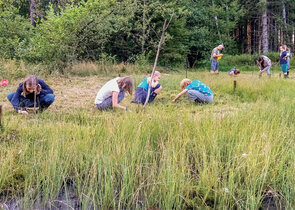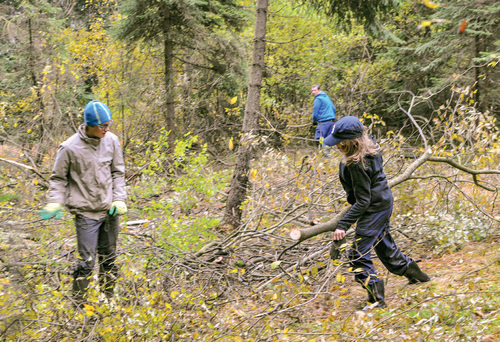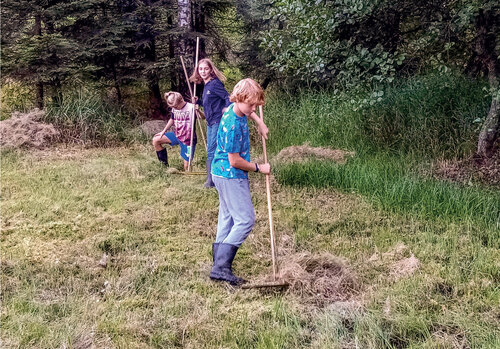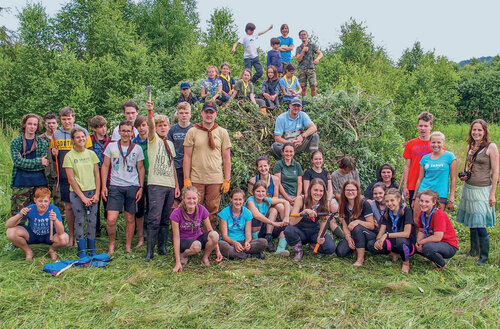Nature Conservation 2023 — 5. 6. 2023 — Focusing on the Public — Print article in pdf
Patronages of the Scout Institute – Involvement of Scouts (and not only them) in Nature Conservation

With its patronages, the Scout Institute helps scout troops and school classes engage in landscape restoration and nature conservation. In collaboration with expert guides and stewards, participants learn not only about natural values but also about the importance of building relationships with all stakeholders. In this way they develop two basic civic competences: responsibility for the condition of public space and awareness of the opportunity which everyone has to positively influence their environment. At present, patronages are running in the capital city of Prague and in eight regions of the Czech Republic. To date, more than 55 troops and school classes have been engaged in them.
The patronage project, focusing on landscape management, was set up out of the awareness that nature in the Czech Republic faces a range of difficulties, e.g. decreasing species richness and threatened natural habitats. Even though we generally know what to do, the condition of many sites has not been improving. In many cases, small regular interventions would be sufficient. Examples are cleaning pools, scrub cutting, litter raking, sod cutting and other activities which can easily be done by groups of children.
History of the project
The idea of patronages emerged five years ago. One of the primary impulses was a discussion at the meeting of the Working Group for Nature Protection of the Czech Botanical Society (CBS), where it appeared up how important, necessary and difficult it is to also secure small-scale management of less significant sites. Anna Šlechtová (CBS member and long-time active Junák functionary) realised that scout troops offer a great potential of people with natural interest in wildlife who are not indifferent to what is happening around them and put great effort into changing things for the better. Thanks to her contacts and activity, she managed to connect key persons and start a one-year pilot project named Troops for Nature in the Capital City of Prague, generously supported by the Capital City of Prague Municipal Office and staff of the Department of Environmental Protection in 2018. Within two years, around 20 troops had engaged in the project in Prague and the project (with the later name Patronages) naturally started to spread to other regions in the Czech Republic. In addition to scout troops we have also begun targeting other organised youth groups and school classes. In 2020–2021, supported by a grant from the State Environmental Fund, the project scope was expanded to the South Bohemian, South Moravian, Liberec and Plzeň/Pilsen Regions, and since 2022 another four have been added (Central Bohemia, Ústí, Vysočina/Highlands and Zlín Regions).

Patronage at the Tichá říčka/Silent Rivulet Nature Monument. Introductory talk or “What are we going to do here and why”. © Olga Hušková

Cut branches need to be dragged away from the peatbog, shortened and piled up. © Olga Hušková
Method employed
The patronages show children and youth groups how to actively participate in nature conservation. A troop registers for the programme with the intention to take manage a site with natural values in their surroundings. We help them find a site, bring them into connect with the area’s steward and also with an expert guide. The guide helps the participants to understand what the activities are for and which values it creates or preserves. (S)he visits the site with the troop, consults the chosen management with the steward and his/her presence guarantees the suitability of the planned interventions and the quality of their implementation. Collaboration with the steward or the site owner (Nature Conservation Agency of the Czech Republic, National Park, Regional Office, Municipal Office or Land Trust) allows implementing the project in accordance with management plans and conservation objectives of the sites.
A troop should go and check a site at least twice a year (in spring and autumn), but there are groups which have ‘their’ site almost literally at hand and spend willingly much more time there. In this way, they deepen their knowledge of nature conservation and build a relationship to the site in question. The programme further includes simple monitoring and space for making records and photographic documentation. Each Region has a coordinator who is responsible for smooth cooperation.

Scouts from the municipality of Přimda raking up cut small-reed to make way for sundew plants. © Věra Končická
Cooperation with the Nature Conservation Agency of the Czech Republic
On the Capital City of Prague´s territory, cooperation with its Department of Environmental Protection has proven to be effective, whereas the Nature Conservation Agency of the Czech Republic (NCA) is becoming an important partner besides National Park Administrations and Regional Offices in the different Regions. The selection of sites suitable for interventions takes already place in collaboration with NCA Regional Branches, and if a site is adopted by a particular troop, NCA experts often also take on the role of guides. To cover the cooperation formally, a general memorandum between the NCA and Junák will be signed, and also a more specific memorandum between the NCA and the Scout Institute for the needs of the Patronage programme.
Patronages in practice – examples of troop activities
Scouts from the town of Jablonec nad Nisou have taken patronage of the Tichá říčka/Silent Rivulet Nature Monument near the municipality of Hrabětice, professionally led by Ondřej Šnytr (NCA, RB Liberecko). The site consists of a peatbog and fields partly encroached by unwanted trees and shrubs at the margin of the Tichá říčka/Silent Rivulet stream. At the site it is important to prune willows and cut self-seeding shrubs, maintain wet parts, and to create and maintain pools. In October 2021, scouts felled willows between two peatbogs to create there, as required, a coherent treeless field with a future wetland. The youngsters dragged the felled branches to the margin of the reserve (into a mature spruce forest), where they cut them into smaller pieces and made a pile of the larger sticks and twigs. The scouts obviously enjoyed working with saws and shears, and the cut biomass was made into surprisingly small piles which are also useful for the wintering of animals. Thanks to the intervention, the open peatland area was increased.
In the Plzeň/Pilsen Region, the 7th Troop from the town of Přimda has joined the project, guided by Lucie Koryťáková Nováková (NCA, RB Český les Protected Landscape Area Administration) and taken patronage of Kolowratův rybník/Kolowat´s Fishpond Nature Monument situated west of Přimda. The littoral zone of the western bank of the fishpond has a rich population of the critically endangered Oblong-leaved sundew (Drosera intermedia), which is however suppressed by the expanding Purple small-reed (Calamagrostis canescens). In 2021, the scouts visited the site several times and regularly cut and raked up the small-reed and then removed the cut biomass. At the same time, they prepared another spot suitable for the sundew by disturbing the turf with axes and by trampling. They also carried out monitoring under the professional supervision of the guide, thanks to which it was documented that, after two years of regular site management, the small-reed sward had become smaller and sparser and the sundew had demonstrably spread to new sites.
The 1st Troop from the municipality of Holubov in the South Bohemian Region with their guide Jana Janáková (NCA, RB Jižní Čechy) have begun to manage a site not far from their campsite, a wet meadow southwest of the municipality of Tichá near the municipality of Dolní Dvořiště, adjacent to Horní Malše/Upper Malše River Nature Monument. The site is home to the critically endangered Crested wood fern (Dryopteris cristata), the Broad-leaved marsh orchid (Dactylorhiza majalis) and a huge range of other rare species which are threatened by encroachment and overgrowing. The site has no legal territorial protection. Since the site is close to the campsite which the scouts use in the summer holidays, the interventions take place in July. Boy and girl scouts cut away young aspen and willow scrub at the site, so that the grassland can then be mown regularly, thus maintaining it. They make a pile of the cut branches and in the following year they burn the wood, which the site conditions provide for.
COVID-19 time
The course of the project was unfortunately negatively affected by the SARS-CoV-2 virus epidemic and the related anti-pandemic measures. In the spring of 2020, scouting activities were suspended for many weeks and a number of planned interventions had to be cancelled. The situation repeated itself again in autumn, after the vegetation season for which most interventions had been planned. At that time, however, restrictions were tightened again and mass activities were not allowed. In that year the site could thus mainly be visited to do research and carry out monitoring from May to September. In this regard, the year 2021 was only slightly better, but consi-derably more field activities were undertaken.
For this reason, we searched for other possible collaboration between guides and troops, ideally by building relationships to sites. The guides prepared online meetings for the troops, so that the youngsters could then go out into the field individually or with their parents to do work or enjoy a theme game. In other to motivate them to make field trips, we recorded several video invitations to sites where patronages run for the troops in Prague. Also three video excursions to interesting natural sites in Prague (St. Prokop Valley, Čihadla and Divoká Šárka) including ideas for games and activities for children were developed. Further, several online networking meetings of troop leaders and guides across the Czech Republic were held, where they exchanged their experience with interventions at the sites, providing valuable feedback.
Translating the youngster’s enthusiasm into figures, a total of 30 troops took part in the project in 2020, realising 35 site interventions, i.e. more than 500 youngsters performing over 2,000 hours of work. In 2021, a total of 42 troops implemented 45 site interventions, i.e. more than 700 youngsters and 2,500 hours of work.
Expert board
The professional part of the project is supervised by the so-called Expert Board, which meets twice a year. Its members are representatives of scientific institutions and NGOs with long-term experience in nature conservation and environmental education, namely Eva Chvojková (Ametyst), Michal Medek (Kaprálův mlýn), Martin Střelec (Juniperia), Zdeněk Vermouzek and Břeněk Michálek (Czech Society for Ornithology), Zuzana Münzbergová (Charles University - Faculty of Science and Institute of Botany, Academy of Sciences of the Czech Republic), Libor Ambrozek (Czech Union for Nature Conservation) and Jiří Rom (Capital City of Prague Municipal Office). These experts help setting the project concept across various disciplines and organisations and provide the regional coordinators insight into the current problems and trends in nature conservation.
Other environmentally oriented projects of the Scout Institute
The Scout Institute realises how important the topics of climate change, nature conservation and environmental communication, education and public awareness are and implements many other projects mainly focusing on youngsters. We have made a visual programme in four parts titled The Landscape in our Hands, presenting the greatest problems of the Czech Republic´s landscape and how to solve them. It gives individuals and groups guidance on how to choose a type of landscape management to tackle. Linked to this programme the so-called Climate Weekends, aimed at treating the landscape with respect, are organised at farms in the countryside. The programme of these weekends includes troop members devising adaptation measures which they could implement in their clubs. Also a series of lectures on climate change, including environmental, economic, sociological as well as pedagogical aspects of climate change, is organised at the Scout Institute. These lectures were streamed live in the COVID-19 time. For details of all ‘green’ projects of the Scout Institute, see https://www.skautskyinstitut.cz/patronaty.

Children having a lot of fun disturbing turf. Nature conservation need not be boring! © Lucie Koryťáková Nováková

Enjoyment of a job well done. Scout troop from the municipality of Holubov. © Tereza Křivánková
Inspiration for others
The Patronages project of the Scout Institute has shown hundreds of youngsters what nature conservation looks like in practice. We believe that knowing a particular phenomenon under protection coupled to having the opportunity to contribute to its survival is a strong motivation for youngsters. The entire project can only be implemented thanks to the involvement of a number of willing entities, stewards and expert guides who pass their enthusiasm for nature conservation on to youngsters. Thanks to the patronages, youngsters create a relationship to a site, they learn a lot of interesting issues about nature, and inspire others with their activities.

